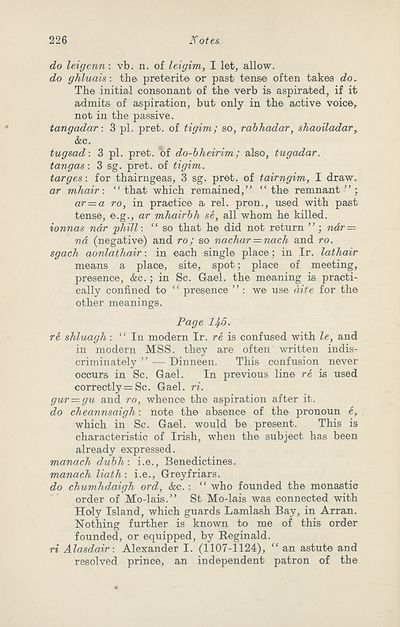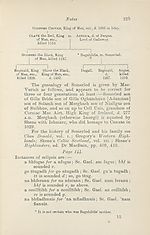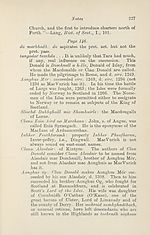Download files
Complete book:
Individual page:
Thumbnail gallery: Grid view | List view

226
Kote&
do leigenn : vb. n. of leigim, I let, allow.
do ghluais: the preterite or past tense often takes do.
The initial consonant of the verb is aspirated, if it
admits of aspiration, but only in the active voice,
not in the passive.
tangadar : 3 pi. pret. of tigim; so, rabhadar, shaoiladar,
&c.
tugsad-. 3 pi. pret. of do-bheirim; also, tugadar.
tangas: 3 sg. pret. of tigim.
targes : for thairngeas, 3 sg. pret. oi tairngim, I draw.
ar mhair: “that which remained,” “the remnant”;
ar—a ro, in practice a rel. pron., used with past
tense, e.g., ar mhairbh se, all whom he killed.
ionnas ndr pliill: “so that he did not return ’ ’; ndr —
nd (negative) and ro; so nachar = nach and ro.
sgach aonlathair: in each single place; in Ir. lathair
means a place, site, spot; place of meeting,
presence, &c.; in Sc. Gael, the meaning is practi¬
cally confined to “ presence ” : we use dite for the
other meanings.
Page 14.5.
rt, shluagh: “ In modern Ir. re is confused with le, and
in modern MSS. they are often written indis¬
criminately ” — Dinneen. This confusion never
occurs in Sc. Gael. In previous line re is used
correctly = Sc. Gael. ri.
gur=gu and ro, whence the aspiration after it.
do cheannsaigh: note the absence of the pronoun e,
which in Sc. Gael, would be present. This is
characteristic of Irish, when the subject has been
already expressed.
manach dubh : i.e., Benedictines.
manach Hath : i.e., Greyfriars.
do chumhdaigh ord, &c. : “ who founded the monastic
order of Mo-lais.” St Mo-lais was connected with
Holy Island, which guards Lamlash Bay, in Arran.
Nothing further is known to me of this order
founded, or equipped, by Reginald.
ri Alasdair : Alexander I. (1107-1124), “ an astute and
resolved prince, an independent patron of the
Kote&
do leigenn : vb. n. of leigim, I let, allow.
do ghluais: the preterite or past tense often takes do.
The initial consonant of the verb is aspirated, if it
admits of aspiration, but only in the active voice,
not in the passive.
tangadar : 3 pi. pret. of tigim; so, rabhadar, shaoiladar,
&c.
tugsad-. 3 pi. pret. of do-bheirim; also, tugadar.
tangas: 3 sg. pret. of tigim.
targes : for thairngeas, 3 sg. pret. oi tairngim, I draw.
ar mhair: “that which remained,” “the remnant”;
ar—a ro, in practice a rel. pron., used with past
tense, e.g., ar mhairbh se, all whom he killed.
ionnas ndr pliill: “so that he did not return ’ ’; ndr —
nd (negative) and ro; so nachar = nach and ro.
sgach aonlathair: in each single place; in Ir. lathair
means a place, site, spot; place of meeting,
presence, &c.; in Sc. Gael, the meaning is practi¬
cally confined to “ presence ” : we use dite for the
other meanings.
Page 14.5.
rt, shluagh: “ In modern Ir. re is confused with le, and
in modern MSS. they are often written indis¬
criminately ” — Dinneen. This confusion never
occurs in Sc. Gael. In previous line re is used
correctly = Sc. Gael. ri.
gur=gu and ro, whence the aspiration after it.
do cheannsaigh: note the absence of the pronoun e,
which in Sc. Gael, would be present. This is
characteristic of Irish, when the subject has been
already expressed.
manach dubh : i.e., Benedictines.
manach Hath : i.e., Greyfriars.
do chumhdaigh ord, &c. : “ who founded the monastic
order of Mo-lais.” St Mo-lais was connected with
Holy Island, which guards Lamlash Bay, in Arran.
Nothing further is known to me of this order
founded, or equipped, by Reginald.
ri Alasdair : Alexander I. (1107-1124), “ an astute and
resolved prince, an independent patron of the
Set display mode to:
![]() Universal Viewer |
Universal Viewer | ![]() Mirador |
Large image | Transcription
Mirador |
Large image | Transcription
| An Comunn Gàidhealach > An Comunn Gàidhealach Publications > Rosg Gaidhlig > (242) |
|---|
| Permanent URL | https://digital.nls.uk/126280292 |
|---|
| Description | This contains items published by An Comunn, which are not specifically Mòd-related. It includes journals, annual reports and corporate documents, policy statements, educational resources and published plays and literature. It is arranged alphabetically by title. |
|---|
| Description | A collection of over 400 items published by An Comunn Gàidhealach, the organisation which promotes Gaelic language and culture and organises the Royal National Mòd. Dating from 1891 up to the present day, the collection includes journals and newspapers, annual reports, educational materials, national Mòd programmes, published Mòd literature and music. |
|---|---|
| Additional NLS resources: |
|

